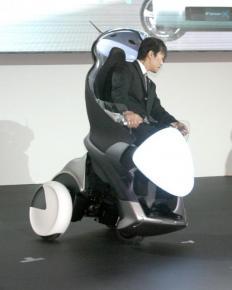...as Count Floyd would say.
I can't wait until our alarmist media gets their chops on this one (story from
Ad Age): an alarmist new book touting all the scary consequences of RFID (Radio Frequency Identification, tiny electronic chips embedded in packaging and other wholesale and retail items to be used primarily for inventory management). That's right, folks: another thing to be Really Really Scared Of, for no real reason--even the title is needlessly Orwellian:
Spychips: How Major Corporations and Government Plan to Track Your Every Move with RFID. Honestly: does anyone think that companies have nothing better to do that track people's every movement? Think about the logistics of handling
that much data. How on earth could that ever be useful? As for the government, well, they have a hard enough time tracking a big-ass hurricane approaching the Gulf States.
So what evidence does the author give for the impending Big Brother scenario?
Despite assurances that it has no current plans to track consumer behavior with RFID, P&G filed for a 2001 patent titled “Systems and Methods for Tracking Consumers in a Store Environment,” the book says.
The key words, I suppose, would be "
in a store environment." Hmm. A technology for tracking consumers in a store. How terrifying. You mean store managers might actually know where in the store I am? Good! It's hard enough attracting sales help as it is.
I admit I have not read the book (I probably should but I really don't want to) but I have been following the development of RFID a bit and it doesn't sound to me like the chips are powerful enough to do all the nasty things the author asserts. Yes, some have anticipated some modest consumer-tracking applications, but it mostly has to do with inventory managenment and theft prevention, and nothing more extreme than what retailers already do with loyalty programs and discount cards. And I honestly have no real objection to Price Chopper knowing how often I buy ketchup. In fact, I wish stores did a
better job of tracking my purchases--it might ensure that the things I want to buy are actually in stock. (Best Buy, for example, has the uncanny ability to determine exactly what it is that I am looking for and go to extreme lengths to ensure that they don't have it.)
But wait--we get to the end of the story:
A second edition of her book due in January links RFID to the “mark of the beast” in the Book of Revelations.
Seriously. OK, so much for credibility. (Reading the user comments on Amazon, the book's fans seem to be Apocalypse fans and the usual crowd that has the date of the Rapture on their wall calendars. Well.)
There are always downsides and unintended consequences to any technology, but lunatic books like this really don't do anyone a service. Whenever we see books or news stories touting all sorts of doomsday scenarios, there are a few things we need to immediately ask: Does the author have an agenda? Do the author's claims make sense from a technological standpoint? Do the author's claims make logical sense?
Yes, there are things out there to be scared (or at least dubious) of. But let's not blow things out of proportion--like the news story I once saw with the headline "Salad: The Silent Killer." If I may quote a Rush lyric, "The things that we fear are a weapon to be used against us."




